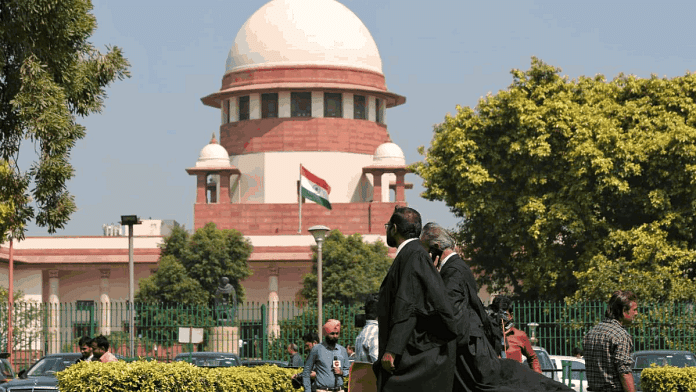New Delhi: The Supreme Court Tuesday referred a batch of petitions challenging the constitutional validity of the sedition law — Section 124A of the Indian Penal Code (IPC) — to a five-judge Constitution Bench.
The court was hearing a clutch of petitions that have challenged Section 124A on the ground that it is a colonial-era provision that places unreasonable restrictions on citizens’ right to free speech and expression.
The development comes over a month after the Narendra Modi government tabled the Bharatiya Nyaya Sanhita Bill, 2023 in Parliament to replace the IPC. It was tabled alongside two other laws — the Bharatiya Suraksha Sanhita Bill to replace the Code of Criminal Procedure, 1973 and the Bharatiya Sakhshya Bill, 2023, to replace the Indian Evidence Act, 1872.
While making the reference Tuesday, the three-judge bench led by Chief Justice D.Y. Chandrachud said it may not be appropriate for a smaller bench to either doubt or overrule the Supreme Court’s previous ruling upholding the law. The court was referring to its 1962 ruling in Kedar Nath Singh versus the State of Bihar, in which a Constitution Bench restricted the application of the provision and introduced the need for an “act of violence” or “incitement of violence” for it to be applicable.
“In our view, the appropriate course is to direct the papers to be placed before the Chief Justice of India to consider that the batch of cases can be heard by a bench of at least five judges,” the SC order noted. “We direct the registry to place the papers before the CJI so that an appropriate decision can be taken on an administrative side to form a bench of at least five judges.”
The court, however, also refused to accede to the central government’s request to defer the hearing on the petitions. In its arguments, the Narendra Modi government had referred to its Bharatiya Nyaya Sanhita Bill to say that it had redefined sedition and that the bill is currently before a parliamentary committee for consideration.
However, the bench, also comprising justices J.B. Pardiwala and Manoj Misra, agreed with the petitioners’ contention that even if a new law were enacted, it wouldn’t undo the prosecutions launched under the existing Section 124A.
The SC’s decision to refer the petitions to a larger bench comes a year after it put on hold all pending proceedings in sedition cases until the central government completes its re-examination of the provision.
Among other things, the Bharatiya Nyaya Sanhita Bill does away with sedition. Instead, it introduces a new provision, Section 150, that recommends imprisonment for life or for up to seven years for anyone who “excites or attempts to excite, secession or armed rebellion or subversive activities, or encourages feelings of separatist activities or endangers sovereignty or unity and integrity of India, or indulges in or commits any such act”.
Also Read: Nehru’s amendment to the Constitution was a revolution. Made sedition an invalid law
‘Narrow’ understanding of fundamental rights in Kedar Nath
Section 124A of the IPC reads: “Whoever by words, either spoken or written, or by signs, or by visible representation, or otherwise, brings or attempts to bring into hatred or contempt, or excites or attempts to excite disaffection towards, 2*** the Government established by law in 3[India], 4*** shall be punished with 5[imprisonment for life], to which fine may be added, or with imprisonment which may extend to three years, to which fine may be added, or with fine.”
In its order Tuesday, the apex court observed that the proposed law would be applicable prospectively and will not affect ongoing prosecutions because their validity would be assessed on the basis of how the law stands today.
On why a five-judge bench should hear the petition, the court said its 1962 judgment in the Kedar Nath Singh case had examined the section on the basis of the narrow understanding of fundamental rights that was prevalent then. Its validity was examined only in the context of Article 19 (freedom of speech and expression), the court said, adding that this had restricted its ruling within this ambit.
But six decades later, it would be necessary to revisit the ruling in light of the doctrines that have evolved since — particularly its bearing on two other articles of the Constitution: Article 14 (Right to Equality) and Article 21 (Right to Life), the bench said.
In their arguments, the petitioners said that the petition in the Kedar Nath Singh case only assailed the legality of the law saying it was in violation of Article 19 of the Constitution. Further, the petitioners argued that the court kept to the provision because of its then prevailing constitutional position — that it would limit itself to the scope of the question and not expand into other areas.
During the hearing, CJI Chandrachud verbally remarked that the five-judge bench ruling in Kedar Nath Singh is no longer a binding precedent in view of subsequent court judgments.
The bench, however, turned down the petitioners’ arguments that the case should be heard buy a seven-judge bench. It said the five-bench judge could further refer the case to a larger bench if necessary.
On his part, Attorney General of India R.Venkataramani informed the court about the proposed replacement of Section 124A, asking it to wait for the outcome of the legislative process.
The bench, however, was not inclined to accept the request, noting that the offence, originally non-cognizable, was made cognizable in 1973, when the new Code of Criminal Procedure was enacted by Parliament.
(Edited by Uttara Ramaswamy)
Also Read: Sedition law is a polarising tool. India is a democracy, not surveillance state



